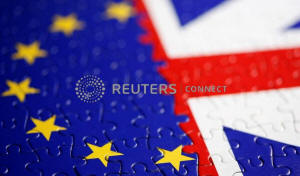UK announces new post-Brexit global tariff regime
 Send a link to a friend
Send a link to a friend
 [May 19, 2020]
By Kylie MacLellan and Elizabeth Piper [May 19, 2020]
By Kylie MacLellan and Elizabeth Piper
LONDON (Reuters) - The United Kingdom
announced a new post-Brexit tariff regime on Tuesday to replace the
European Union's external tariff, maintaining a 10% tariff on cars but
cutting levies on tens of billions of dollars of supply chain imports.
After decades outsourcing its trade policy to the EU, Britain is seeking
free trade agreements with countries around the world and aims to have
deals in place covering 80% of British trade by 2022.
The new tariff regime, in place from January 2021, marks a departure
from what some UK officials call an overly complex EU system, setting
out Britain's stall as it negotiates trade deals with both the United
States and the Brussels-based bloc.

But it will mean that if Britain and the EU fail to reach a free trade
deal by the end of the year, the price of some food, cars and some
chemical inputs imported from the bloc would rise sharply.
Britain said the regime, known as UK Global Tariff, would be simpler and
cheaper than the EU's Common External Tariff. It will apply to countries
with which it has no agreement and removes all tariffs below 2%.
"Our new Global Tariff will benefit UK consumers and households by
cutting red tape and reducing the cost of thousands of everyday
products," International Trade Secretary Liz Truss said.
The government said tariffs would be eliminated on a wide range of
products, with 60% of trade coming into the UK tariff-free on WTO terms
or through existing preferential access.
[to top of second column]
|

Puzzle with printed EU and UK flags is seen in this illustration
taken November 13, 2019. REUTERS/Dado Ruvic/Illustration

The UK will maintain tariffs on products competing with industries
such as agriculture, automotive and fishing, and remove levies on 30
billion pounds ($37 billion) worth of imports entering UK supply
chains.
"Keeping agricultural protection makes sense as a bargaining chip
for EU & US trade negotiations. But means big cost increases for
agriculture imports if no UK-EU FTA," said Thomas Sampson, Associate
Professor at the London School of Economics.
The UK will also remove tariffs on products which support energy
efficiency and will introduce a temporary zero tariff on goods being
used to fight COVID-19 such as personal protective equipment.
The new regime did not meet all expectations.
A representative from one chemical company who declined to be
identified said the firm had been promised an elimination of tariffs
on inputs for the sector. "It's disappointing across the board," the
representative said.
(Additional reporting by Guy Faulconbridge; editing by Philippa
Fletcher)
[© 2020 Thomson Reuters. All rights
reserved.] Copyright 2020 Reuters. All rights reserved. This material may not be published,
broadcast, rewritten or redistributed.
Thompson Reuters is solely responsible for this content. |